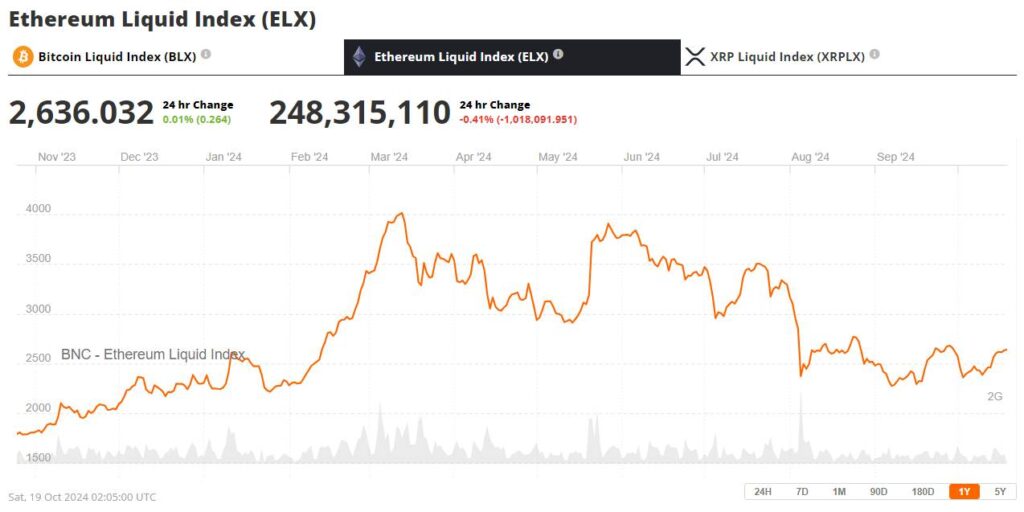Ethereum’s Pectra Fork Introduces Dynamic Blob Fees for Improved Layer 2 Scaling

With the forthcoming Pectra fork, developers are preparing for another big update, seven months after introducing blob transactions with Ethereum’s Dencun upgrade. This new Ethereum Improvement Proposal (EIP-7742) seeks to improve the network’s scalability by streamlining blob-carrying transactions.
Christine Kim, Vice President of Research at Galaxy Digital, shared details of the proposal via X on Oct. 17 following Ethereum’s “All Core Devs” meeting. The EIP will allow the Ethereum consensus layer to dynamically adjust Blob gas targets and maximum values, which is expected to enhance the efficiency of Layer 2 (L2) transactions.
What Are Ethereum Blobs?
Ethereum Blobs are large, temporary data chunks incorporated into Ethereum transactions. Blobs were first implemented in Ethereum’s Dencun upgrade on March 13, 2024, via EIP-4844 to reduce the cost of L2 transactions, but the fixed blob count is now approaching capacity. Vitalik Buterin, the co-founder of Ethereum, recently expressed concerns that this limit could impede scalability if not addressed quickly.
Kim believes that the EIP-7742 update may increase the blob count in the Pectra upgrade. Other potential scalability improvements, such as altering the gas limit or slot time, are unlikely to be included in this fork. Ethereum developer Alex Stokes elaborated further on GitHub, explaining that a more flexible target value for blob parameters will reduce the rigidity caused by the current fixed limits.
The Pectra fork is anticipated to roll out by the end of 2024 or early 2025. Another proposal, EIP-7623, aims to create more space for Blobs by reducing Ethereum’s maximum block size from 2.7 MB to around 1 MB.
This development aligns with Buterin’s broader objective of enabling Ethereum to achieve 100,000 transactions per second by incorporating mainnet and Layer 2 scaling solutions, a vital component of Ethereum’s “The Surge” strategy.
Layer 2 Scaling’s Impact on Ethereum’s Revenue
Layer 2 scaling methods have significant drawbacks, even though they promise cheaper transactions. According to Matthew Sigel, Head of Digital Asset Research at VanEck, Ethereum’s revenue share from transactions has dropped significantly as Layer 2 networks take over a larger portion of the ecosystem.
Sigel pointed out in an Oct. 17 post on X that over the last four months, the revenue split between Ethereum mainnet and Layer 2s has shifted to 10:90, a complete reversal of the 90:10 ratio used in earlier forecasts. It forced Sigel to revise VanEck’s bullish prediction that Ether would surpass $22,000 by 2030, which was estimated under the assumption of a 90:10 revenue split—the exact opposite of what’s happened over the last four months. If that split remains the same, Sigel said VanEck’s Ether price target would fall 67% to $7,330.
It could get even worse with one of Ethereum’s largest revenue drivers, decentralized exchange Uniswap, pivoting from Ethereum by creating its new layer 2 “Unichain.”
Ethereum Demand Slows

The Ethereum price has been on a steady decline since its recent peak of $3907 on May the 27th. Source: Brave New Coin Ethereum Liquid Index
According to FxStreet, US spot Ethereum ETFs experienced three days of inflows and one day of minor outflows, totaling $79.9 million by Thursday. Tracking ETF flows can provide useful information about institutional opinion toward Ethereum, but the current level of inflows must increase dramatically before it can have a significant impact on its price.
Compared to other cryptocurrencies, Ethereum’s price has not performed as well since the bull market began in late 2023. The lukewarm debut of US-listed spot ETH ETFs and sluggish demand are two reasons for this shortfall. Between August and October, Open Interest (OI) rose by 28.57% to reach $9.6 billion, but this is still significantly lower than the $13 billion seen in June.
#Ethereums #Pectra #Fork #Introduces #Dynamic #Blob #Fees #Improved #Layer #Scaling
News plays a pivotal role in our lives by keeping us informed and connected to the world. It serves as a critical source of information, offering updates on current events, politics, economics, science, and more. Through news, we gain awareness of global issues and local developments, helping us make informed decisions in our personal and professional lives. News also fosters discussion and debate, encouraging critical thinking and perspective-taking. Moreover, it promotes transparency and accountability among governments, businesses, and other institutions. In a rapidly changing world, staying updated with the news enables us to adapt to new challenges and opportunities, shaping our understanding of the complexities of society. Ultimately, news is not just about information; it empowers us to participate actively in the world around us, contributing to a more informed, engaged, and responsible global citizenry.
Health is fundamental to our well-being and quality of life, making it an essential aspect of daily existence. It encompasses physical, mental, and emotional aspects, influencing our ability to function effectively and enjoy life fully. Prioritizing health allows individuals to maintain optimal physical fitness, reducing the risk of diseases and promoting longevity. Mental health, equally crucial, affects our cognitive abilities, emotional stability, and overall happiness. Investing in preventive healthcare through exercise, balanced nutrition, and regular medical check-ups helps in early detection of potential health issues, ensuring timely intervention and treatment. Beyond individual benefits, a population’s health impacts societal productivity and economic stability. Governments and organizations worldwide emphasize public health initiatives to address pandemics, health disparities, and promote overall well-being. Ultimately, health serves as the foundation upon which we build our lives, influencing our ability to pursue goals, nurture relationships, and contribute meaningfully to society.
Money plays a crucial role in our lives as a means of financial security and freedom. It enables us to meet basic needs such as food, shelter, and healthcare, while also providing opportunities for education, travel, and personal growth. Beyond material comforts, money facilitates social connections and experiences that enrich our lives. It empowers individuals to invest in their futures, whether through savings, investments, or entrepreneurial ventures, thereby fostering economic stability and growth. However, the pursuit of wealth should also be balanced with ethical considerations, as money can influence relationships and societal dynamics. Responsible management of finances is key to achieving long-term goals and mitigating financial stress. Ultimately, while money is a tool for achieving aspirations and fulfilling desires, its true value lies in how it is utilized to improve both personal well-being and the broader community.
Earning Easy Money in 2024: Opportunities and Considerations 💸
In 2024, the landscape of earning easy money presents diverse opportunities, albeit with considerations. The digital age offers platforms for freelancing, online trading, and e-commerce, allowing individuals to leverage skills and creativity for financial gain. Cryptocurrency investments continue to allure with potential for quick profits, yet they entail high volatility and risk. Moreover, the rise of the gig economy enables flexible work arrangements through apps and websites, offering quick payouts but often without job security or benefits. Passive income streams such as rental properties and investments in stocks or bonds remain viable, but demand initial capital and ongoing management. Amid these options, caution is essential to avoid scams and unsustainable ventures promising overnight success. Ultimately, while the allure of easy money persists, informed decisions, diligence, and a long-term perspective are crucial for sustainable financial growth and security in the dynamic year ahead.







